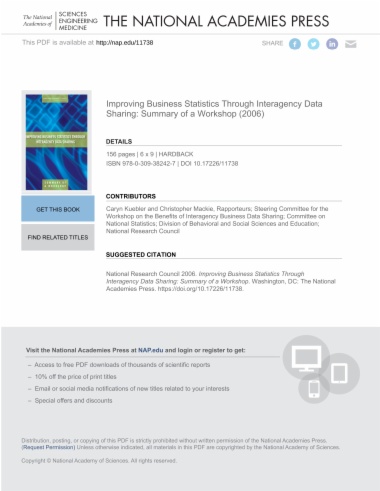

U.S. business data are used broadly, providing the building blocks for key national—as well as regional and local—statistics measuring aggregate income and output, employment, investment, prices, and productivity. Beyond aggregate statistics, individual- and firm-level data are used for a wide range of microanalyses by academic researchers and by policy makers. In the United States, data collection and production efforts are conducted by a decentralized system of statistical agencies. This apparatus yields an extensive array of data that, particularly when made available in the form of microdata, provides an unparalleled resource for policy analysis and research on social issues and for the production of economic statistics. However, the decentralized nature of the statistical system also creates challenges to efficient data collection, to containment of respondent burden, and to maintaining consistency of terms and units of measurement. It is these challenges that raise to paramount importance the practice of effective data sharing among the statistical agencies.
With this as the backdrop, the Bureau of Economic Analysis (BEA) asked the Committee on National Statistics of the National Academies to convene a workshop to discuss interagency business data sharing. The workshop was held October 21, 2005.
This report is a summary of the discussions of that workshop. The workshop focused on the benefits of data sharing to two groups of stakeholders: the statistical agencies themselves and downstream data users. Presenters were asked to highlight untapped opportunities for productive data sharing that cannot yet be exploited because of regulatory or legislative constraints. The most prominently discussed example was that of tax data needed to reconcile the two primary business lists use by the statistical agencies.